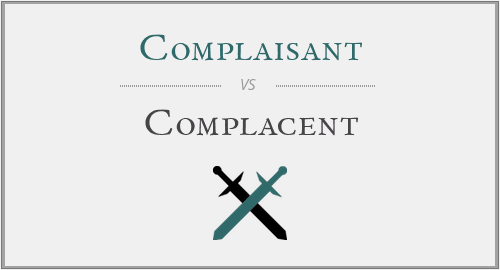John is a complaisant guy, I don’t know how he ended up marrying somebody as complacent as Mary.
The above sentence have two adjectives in it; complaisant and complacent, which describe the character of John and Mary respectively. Can you figure out what they mean? What kind of person is John and how is his wife Mary different from him personality wise?
Complaisant and complacent are a pair of words called homophones, words that sound alike but have different spellings and meanings. They are often confused by the most expert writers so you don’t have to judge yourself for your guilty conscience. They are both employed as adjectives in English language, which gives us all the more reason to mix them up for each other. Today, we will try and eliminate your confusion about incredibly similar words and when you can use them without making a mistake.
Origin:
Both complacent and complaisant descend from Latin complacere, “to please, to be pleasant,” but they have acquired different meanings in English. So both words are related too, another sigh of relief.
Complaisant as adjective:
Complaisant is employed when you are referring to a person who is always willing to please others or to accept what they do or say without protest. It has synonyms like willing, assenting, acquiescent, agreeable, amenable, cooperative, accommodating and obliging etc. By closing down one plant and punishing its workers, workers in other plants would be forced into more complaisant behavior.
The complaisant guard let them in without an explanation.
Complacent as adjective:
Complacent on the other hand, is commonly used for a person who is always showing smug or uncritical satisfaction with oneself or one's achievements. It also means a person who is apathetic with regard to an apparent need or problem. With the most famous synonym smug, complacent signifies self-pride and self-admiration. You can't afford to be complacent about security
Complacent investors have a way of pushing markets steadily higher despite the swirl of bad news around them.
Examples:

Given the nonmanufacturing index is seen as a good leading indicator of growth, investors shouldn’t grow complacent. (Wall Street Journal)
It’s generally considered today that Pasok, which continues to dominate the interim coalition, has all along been complaisant and compliant towards EU impositions. (Irish Times)
Henry Miller set out to shock the complacent American bourgeoisie with his heady mix of sex and philosophy. (Guardian)
[Their] emotional ménage à trois is more potent than the one Jung is having with Sabina and his complaisant wife. (Guardian)
The ruling British lived a complacent, comfortable life, overseeing the activities of the Malay, Chinese, Arab and Indian residents. (The Australian)
But my goat, Cookie, was complaisant and calm. (Chron)
Complaisant or complacent
The adjective complacent convey the idea of self-satisfaction accompanied by a lack of awareness of a potential danger. The adjective complaisant entered the language by way of French about two hundred years after complacence. It retains its French spelling and the meaning of being pleasant to others. A complaisant person is eager to please. Remember that complaisant ends with –sant just like pleasant.
You didn’t find this article too complacent, did you?




Have a discussion about this article with the community:
Report Comment
We're doing our best to make sure our content is useful, accurate and safe.
If by any chance you spot an inappropriate comment while navigating through our website please use this form to let us know, and we'll take care of it shortly.
Attachment
You need to be logged in to favorite.
Log In